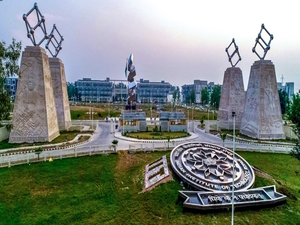Chandigarh, Jan 10 (IANS) The Indian Institute of Technology Ropar in Punjab on Friday announced the launch of its ground-breaking NanoAqua Nanobubble Generator, India’s first-of-its-kind, chemical-free approach to water treatment, pond and lake restoration, aquaculture and agriculture.
The cost-effective technology, which marks a revolutionary step in sustainable water management, has been developed by iHub — AWaDH (Agriculture and Water Technology Development Hub), a premier innovation hub of IIT Ropar, established under the National Mission on Interdisciplinary Cyber-Physical Systems (NM-ICPS) of the Department of Science and Technology (DST) of the government of India.
Developed by Dr. Neelkanth Nirmalkar, one of AWaDH’s domain coordinators and a faculty member at IIT Ropar, the NanoAqua Nanobubble Generator leverages advanced nanotechnology to address critical challenges in water treatment, aquaculture, agriculture, and industrial applications.
Designed and developed entirely in India, this patented solution is poised to redefine eco-friendly water management practices with its high efficiency, energy-saving capabilities, and affordability, an official statement said.
NanoAqua’s nanobubble technology has treated over one million cubic metres of water, delivering significant environmental, social, economic, and health benefits.
Environmentally, it has improved water quality, increased biodiversity, and stabilised ecosystems.
Economically, the technology has boosted tourism, recreation, and property values while providing long-term, cost-effective water treatment solutions.
Socially, it has enhanced community spaces for recreation, fostering a sense of well-being and community pride.
The chemical-free treatment improves public health, supports agriculture and aquaculture, and strengthens food security, fostering community well-being and economic growth.
In pilot installations, such as the Phool Kalan community pond restoration in Ropar and Rang Sagar Lake in Udaipur, the NanoAqua Nanobubble Generator has been implemented in government projects across Uttar Pradesh, Himachal Pradesh, Rajasthan, Punjab, and Madhya Pradesh, as well as in seven self-financed projects.
These installations have demonstrated significant improvements within the first month of operation, in water clarity, reduced algae growth, and enhanced water quality.
These outcomes underline its potential to revolutionise water management while promoting environmental sustainability.
–IANS
vg/pgh






























